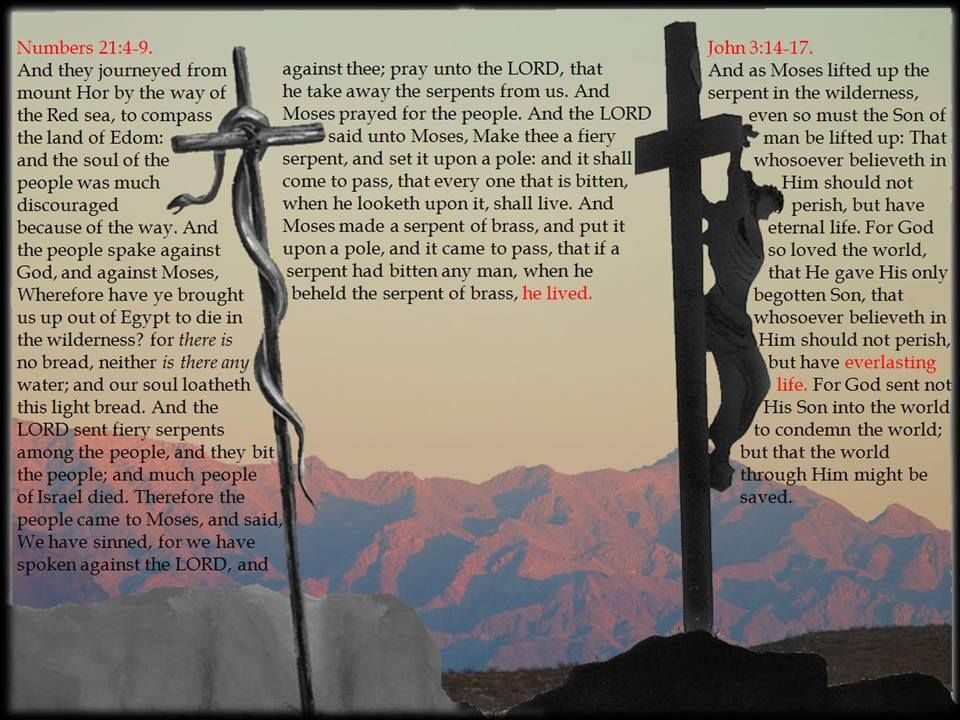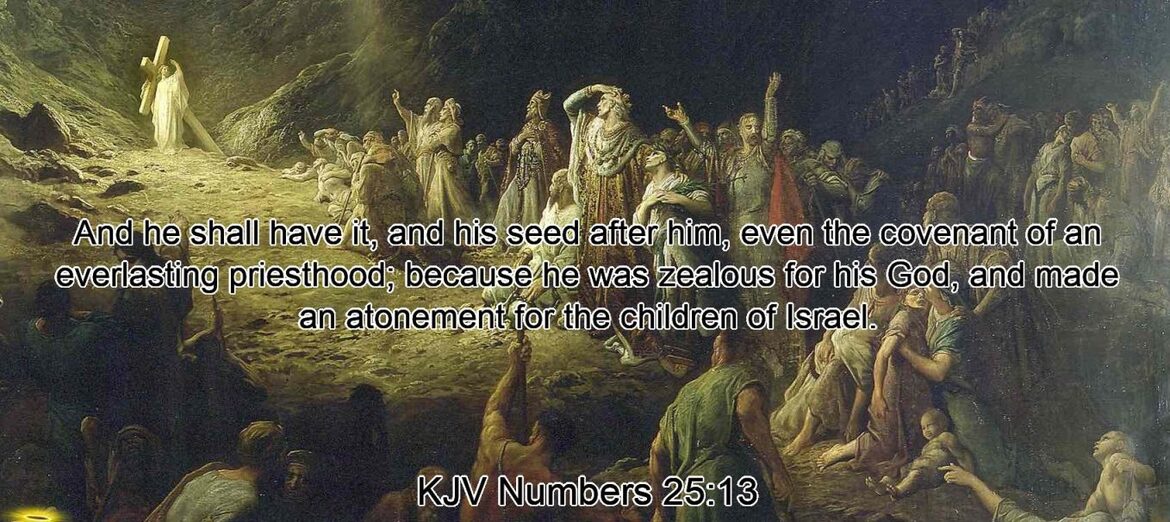Michael
Well-known member
- Joined
- Jun 21, 2019
- Messages
- 691
- Location
- SoCal
- Gender
- Male
- Religious Affiliation
- Non-Denominational
- Political Affiliation
- Conservative
- Marital Status
- Married
ETERNAL PRIESTHOOD
Part 2
~ Continuing from Part 1, on our Study on the promise made to Phinehas and his seed, from the events that Paul references in 1Cor 10:8 ~
Back to the key figure in our opening passages (Numbers 25:1-13 and Psalm 106:28-21)…
Interesting as well, is the meaning of the name of this priest: Phinehas.
פִּינְחָס (Pîynᵉchâç) Phinehas, Strongs’ H6372 -
Word Origin: Apparently from H6310 (mouth) and a variation of H5175 (serpent, or in Chaldee ‘brass’; from root word H5172 which can mean ‘divine.’)
Definition: “mouth of a serpent” or "mouth of brass"
1. son of Eleazar and grandson of Aaron; his zealousness for the Lord averted a plague on Israel and gained him the promise of the Lord of an everlasting priesthood
The meaning of his name really got me stirred up and brought immediately to mind the “serpent of brass” or “bronze serpent” of the incident in Numbers chapter 21.
“And they journeyed from Mount Hor by the way of the Red Sea to compass the land of Edom, and the soul of the people was much discouraged because of the way.
5 And the people spoke against God and against Moses: “Why have ye brought us up out of Egypt to die in the wilderness? For there is no bread, neither is there any water; and our soul loatheth this light bread.”
6 And the Lord sent fiery serpents among the people, and they bit the people; and many people of Israel died.
7 Therefore the people came to Moses and said, “We have sinned, for we have spoken against the Lord and against thee. Pray unto the Lord, that He take away the serpents from us.” And Moses prayed for the people.
8 And the Lord said unto Moses, “Make thee a fiery serpent, and set it upon a pole. And it shall come to pass that every one who is bitten, when he looketh upon it, shall live.”
9 And Moses made a serpent of brass, and put it upon a pole; and it came to pass that if a serpent had bitten any man, when he beheld the serpent of brass he lived.”
– Num 21:4-9 KJ21

In the Mount Hor episode, the “brass serpent” represented “atonement” for the people who looked upon it, just as Phinehas, the Scripture says “made atonement for the children of Israel” (Num 25:13) by his action.
And Jesus says that incident in Numbers 21 was a precursor of His atonement on the Cross -
“as Moses lifted up the serpent in the wilderness, so must the Son of Man be lifted up, 15 that whoever believes in Him may have Eternal Life.” – John 3:14-15
This in itself is a fascinating analogy, and perhaps a study for another time. But what I see that ties our study here together is the Truth that Jesus came to “destroy the works of the devil” (1John 3:8), that “prince of the power of the air” (Eph 2:2), the “god of this age” (2Cor 4:4), who is the “father of lies.” (John 8:44)
(We'll see how this ties in shortly... )
~ Continued below ~
.
Part 2
~ Continuing from Part 1, on our Study on the promise made to Phinehas and his seed, from the events that Paul references in 1Cor 10:8 ~
Back to the key figure in our opening passages (Numbers 25:1-13 and Psalm 106:28-21)…
Interesting as well, is the meaning of the name of this priest: Phinehas.
פִּינְחָס (Pîynᵉchâç) Phinehas, Strongs’ H6372 -
Word Origin: Apparently from H6310 (mouth) and a variation of H5175 (serpent, or in Chaldee ‘brass’; from root word H5172 which can mean ‘divine.’)
Definition: “mouth of a serpent” or "mouth of brass"
1. son of Eleazar and grandson of Aaron; his zealousness for the Lord averted a plague on Israel and gained him the promise of the Lord of an everlasting priesthood
The meaning of his name really got me stirred up and brought immediately to mind the “serpent of brass” or “bronze serpent” of the incident in Numbers chapter 21.
“And they journeyed from Mount Hor by the way of the Red Sea to compass the land of Edom, and the soul of the people was much discouraged because of the way.
5 And the people spoke against God and against Moses: “Why have ye brought us up out of Egypt to die in the wilderness? For there is no bread, neither is there any water; and our soul loatheth this light bread.”
6 And the Lord sent fiery serpents among the people, and they bit the people; and many people of Israel died.
7 Therefore the people came to Moses and said, “We have sinned, for we have spoken against the Lord and against thee. Pray unto the Lord, that He take away the serpents from us.” And Moses prayed for the people.
8 And the Lord said unto Moses, “Make thee a fiery serpent, and set it upon a pole. And it shall come to pass that every one who is bitten, when he looketh upon it, shall live.”
9 And Moses made a serpent of brass, and put it upon a pole; and it came to pass that if a serpent had bitten any man, when he beheld the serpent of brass he lived.”
– Num 21:4-9 KJ21

In the Mount Hor episode, the “brass serpent” represented “atonement” for the people who looked upon it, just as Phinehas, the Scripture says “made atonement for the children of Israel” (Num 25:13) by his action.
And Jesus says that incident in Numbers 21 was a precursor of His atonement on the Cross -
“as Moses lifted up the serpent in the wilderness, so must the Son of Man be lifted up, 15 that whoever believes in Him may have Eternal Life.” – John 3:14-15
This in itself is a fascinating analogy, and perhaps a study for another time. But what I see that ties our study here together is the Truth that Jesus came to “destroy the works of the devil” (1John 3:8), that “prince of the power of the air” (Eph 2:2), the “god of this age” (2Cor 4:4), who is the “father of lies.” (John 8:44)
(We'll see how this ties in shortly... )
~ Continued below ~
.

